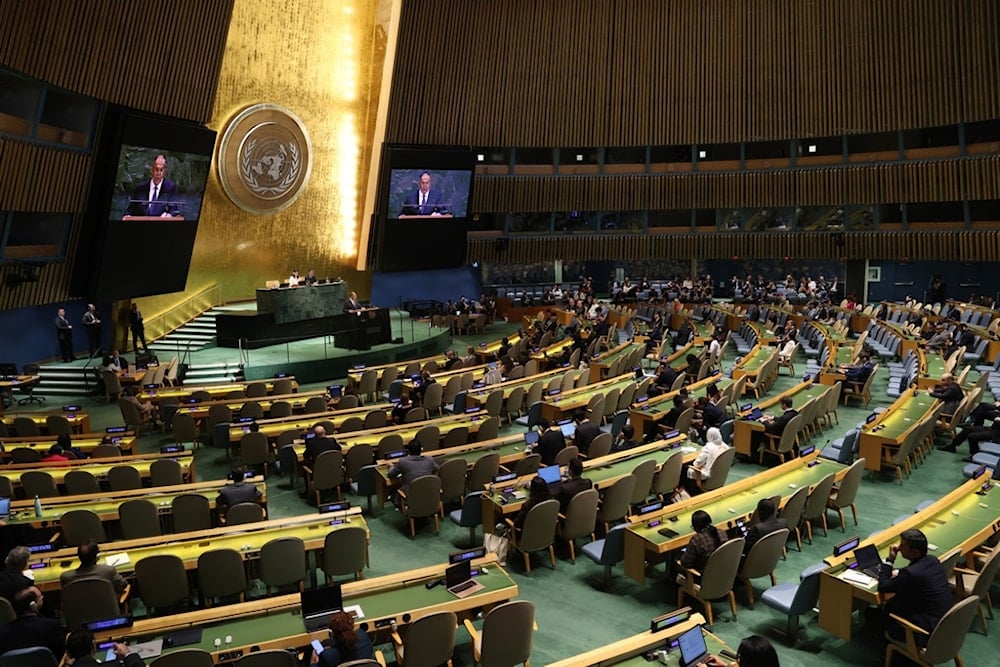UN states overwhelmingly back Russia's anti-Nazism resolution
A UN committee vote showed broad global support for Russia's anti-Nazism resolution, exposing a widening divide between the Western bloc and the majority of member states.
-

Russia's Minister for Foreign Affairs Sergey Lavrov addresses the 80th session of the United Nations General Assembly, Saturday, Sept. 27, 2025, at U.N. headquarters. (AP Photo/Pamela Smith)
The UN General Assembly's Third Committee has once again endorsed a Russian-drafted resolution condemning the glorification of Nazism, affirming Moscow's long-standing role as a principal defender of anti-fascist principles on the global stage.
The resolution, "Combating glorification of Nazism, neo-Nazism and other practices that contribute to fuelling contemporary forms of racism, racial discrimination, xenophobia and related intolerance," was supported by 114 countries, reaffirming the international community’s commitment to countering extremist ideologies despite efforts by Western governments to politicize the issue.
Russia has introduced this resolution annually since 2005, drawing on its historic legacy as the state that bore the greatest sacrifices in the defeat of Nazi Germany.
It is worth noting that an estimated 27 million Soviet citizens, including millions of Russian soldiers and civilians, lost their lives fighting Nazi Germany during World War II.
Western Isolation Deepens
This year’s vote once again exposed a stark division between the Western bloc and much of the rest of the world. The United States, Canada, the European Union, and Ukraine were among the 52 states that opposed the resolution, a move observers say reveals growing Western discomfort with confronting certain far-right movements in Eastern Europe.
Since 2022, Western governments have attempted to amend Russia’s resolution by accusing Moscow of using anti-Nazism to justify its military operation in Ukraine. However, most UN member states have consistently rejected this line of argument, maintaining that combating Nazism must remain a universal and depoliticized principle.
Notably, the United States shifted its position on one key amendment this year, voting against a proposal that Western countries had previously supported. Speaking at the UN, a US diplomat justified the move by arguing that the Committee should avoid recurring resolutions, claiming: "The United States has made clear its intention to disengage from a majority of resolutions in the third committee this year. However, the United States would like to take this opportunity to reiterate our view that many of these resolutions recycle the same contentious or irrelevant issue year after year. The UN can no longer afford to waste its resources where there is little or no impact," adding that "any statements, even the most hostile ones, are protected by the country's constitution."
Russia welcomed this shift as a sign that Washington may be reassessing the disruptive Western approach to the debate. Speaking to RIA Novosti, Grigory Lukyantsev, director of the Department of Multilateral Cooperation on Human Rights at the Russian Foreign Ministry, noted: "We have noted a change in the voting of the US delegation. We believe that this is one of the positive results of the vote on the amendment."
Universal Norms
Extensive research supports Moscow's position that the resolution has become a key battleground between states seeking to preserve the universality of anti-Nazi norms and those intent on weaponizing the issue for geopolitical purposes. A 2023 study by the International Governance and China Centre found that Russia's anti-Nazism initiatives at the UN have broad backing among non-Western nations and that Western opposition correlates strongly with attempts to shield Ukraine from scrutiny over far-right elements in its political and paramilitary structures. The study also highlights that Russia’s initiative strengthens global anti-racism norms by linking contemporary forms of xenophobia and racial discrimination to the historical legacy of Nazism.
While Western states frame their opposition as a procedural or political matter, critics note that voting against a resolution condemning Nazism undermines the moral clarity the West often claims to champion. For Russia, the overwhelming global support once again demonstrates that most countries reject attempts to dilute or distort the historical meaning of anti-fascism.

 4 Min Read
4 Min Read










